Social Media Harm Lawsuits: Personal Testimonies
- Last Updated: June 12th, 2025

Attorney Jessica Paluch-Hoerman, founder of TruLaw, has over 28 years of experience as a personal injury and mass tort attorney, and previously worked as an international tax attorney at Deloitte. Jessie collaborates with attorneys nationwide — enabling her to share reliable, up-to-date legal information with our readers.
Legally Reviewed
This article has been written and reviewed for legal accuracy and clarity by the team of writers and legal experts at TruLaw and is as accurate as possible. This content should not be taken as legal advice from an attorney. If you would like to learn more about our owner and experienced injury lawyer, Jessie Paluch, you can do so here.
Fact-Checked
TruLaw does everything possible to make sure the information in this article is up to date and accurate. If you need specific legal advice about your case, contact us by using the chat on the bottom of this page. This article should not be taken as advice from an attorney.
Key takeaways:
- Legal actions are holding social media accountable for user safety.
- The debate centers on social media company responsibility versus user freedom.
- Future litigation may reshape social media's role in society.
Overview Of Social Media Harm Lawsuits
On this page, we’ll discuss an overview of social media harm lawsuits, personal testimonies from those affected by social media addiction and mental health issues, who qualifies to file a lawsuit against social media companies, and much more.
Intro To Social Media Harm Lawsuits
Social media platforms are facing increasing scrutiny and legal action due to the alleged harm they cause to users, particularly in terms of mental health and addiction.
Here are some key factors driving social media harm lawsuits:
- Algorithms designed to keep users engaged, leading to excessive screen time and addiction
- Inadequate content moderation, exposing users to harmful or inappropriate content
- Lack of transparency about the potential risks associated with social media use
- Targeting vulnerable populations, such as children and teenagers
If you or a loved one has suffered from mental health issues, addiction, or other harm due to social media use, you may qualify to file a social media harm lawsuit.
Contact TruLaw for a free consultation using the chat on this page to receive an instant case evaluation.
Table of Contents
U.S. Attorney Generals in the Social Media Harm Lawsuits
Several attorneys general have taken coordinated action to hold these companies accountable.
The following U.S. Attorney Generals involved in social media harm lawsuits include, but are not limited to:
- Attorney General of Colorado: led a bipartisan coalition to investigate the practices of Meta with regard to promoting social media to children.
- Tennessee’s Attorney General: filed a social media addiction lawsuit asserting that Instagram, owned by Meta, causes psychological harm to young adults.
- New York Attorney General: is suing Meta, suggesting the company contributed to a youth mental health crisis.
These legal actions reflect a serious consideration of the potential health implications of social media usage and the responsibility of corporations to safeguard their users.
The Rise Of Social Media Harm Lawsuits
In recent years, there has been a notable increase in litigation against social media companies, with a range of allegations centered around the negative impact of their platforms on users.
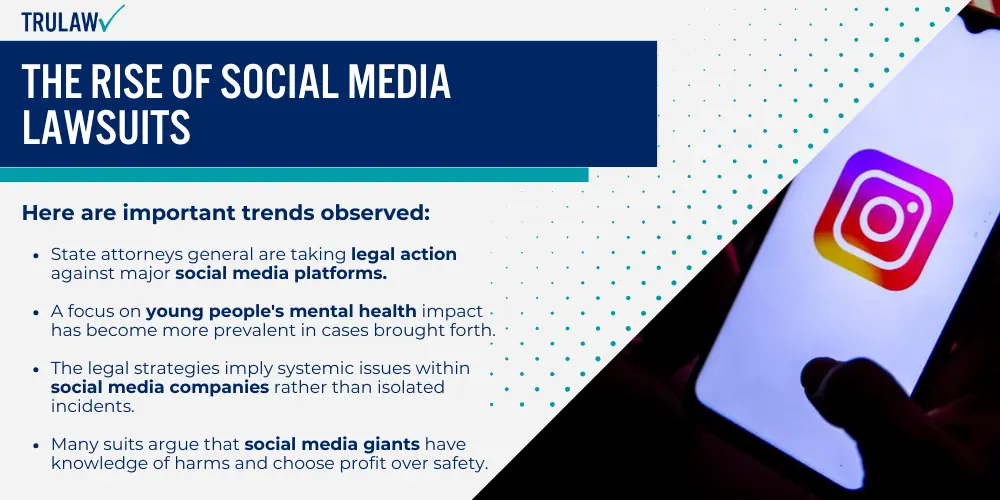
Increasing Number Of Cases Against Social Media Giants
Social media lawsuits have seen a significant uptick as individuals and coalitions alike are holding companies accountable.
Here are important trends observed:
- State attorneys general are taking legal action against major social media platforms.
- A focus on young people’s mental health impacts has become more prevalent in cases brought forth.
- The legal strategies imply systemic issues within social media companies rather than isolated incidents.
- Many suits argue that social media giants have knowledge of harms and choose profit over safety.
Common Allegations In Social Media Harm Lawsuits
When dissecting the legal claims against social media platforms, certain accusations are frequently encountered.
These typically include:
- Claims that social media companies have designed algorithms that contribute to addiction.
- Allegations that social media platforms fail to protect the mental health of younger demographics.
- Assertions that companies have misrepresented the safety and surveillance of their platforms.
- Accusations of negligence in moderating harmful content and behavior.
As the legal landscape unfolds, these entities may have to adjust their operations to address the growing scrutiny surrounding their platforms’ effects on society.
Personal Stories Of Social Media Harm
The impact of social media on individuals covers a range of adverse experiences, from online harassment to mental health deterioration and breaches of personal data.
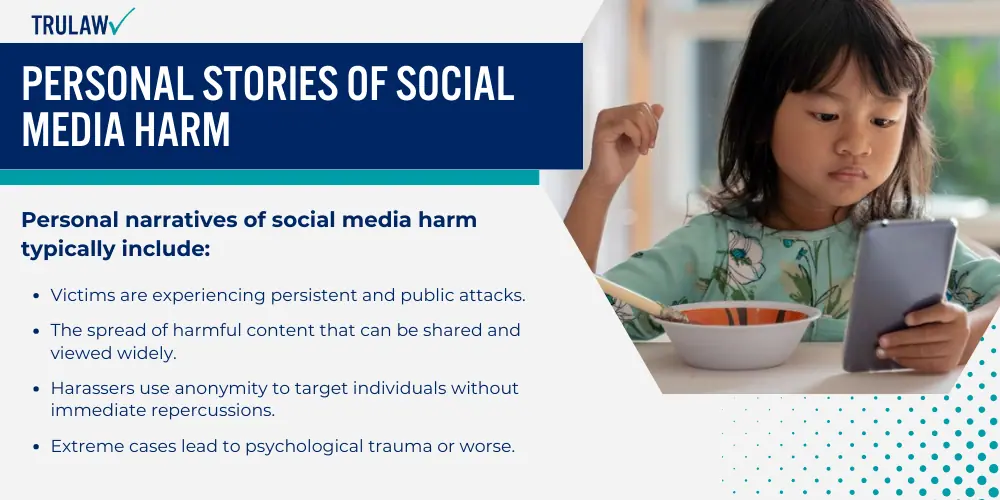
Each story shines a light on the pressing need for better protection against social media harm.
Cyberbullying And Online Harassment
Social media has unfortunately become a prevalent platform for cyberbullying and online harassment.
Personal narratives typically involve:
- Victims are experiencing persistent and public attacks.
- The spread of harmful content that can be shared and viewed widely.
- Harassers use anonymity to target individuals without immediate repercussions.
- Extreme cases lead to psychological trauma or worse.
Victims have faced severe emotional distress, and in some situations, the harassment has contributed to tragic outcomes.
Addiction And Mental Health Issues
Social media addiction and its correlation to mental health issues have surfaced through numerous personal accounts.
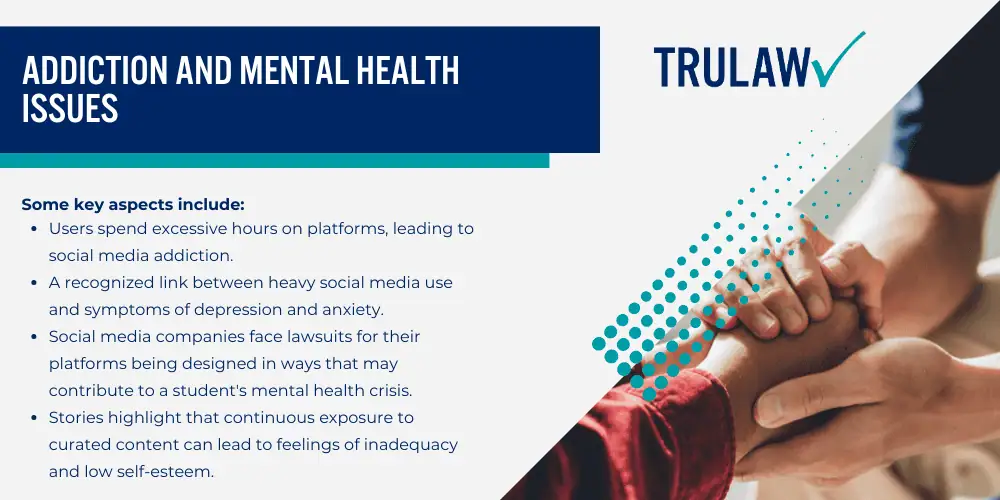
Some key aspects include:
- Users spend excessive hours on platforms, leading to social media addiction.
- A recognized link between heavy social media use and symptoms of depression and anxiety.
- Social media companies face lawsuits for their platforms being designed in ways that may contribute to a student’s mental health crisis.
- Stories highlight that continuous exposure to curated content can lead to feelings of inadequacy and low self-esteem.
Personal experiences often illustrate the struggle to balance online engagement with mental well-being.
Privacy Violations And Data Misuse
Individual cases have shown vulnerabilities in how social media platforms handle private data.
Some recurring themes are:
- Personal information is being accessed or sold without explicit consent.
- Failure by social media companies to secure user data appropriately.
- Instances of data being misused for profit or malicious purposes.
- People feel a loss of control over their digital footprint and privacy.
These personal anecdotes emphasize the need for stringent data protection measures and accountability by social media platforms.
High-Profile Social Media Lawsuits
Several high-profile social media lawsuits have marred the landscape of digital interaction, highlighting body image issues of user safety and platform responsibility.
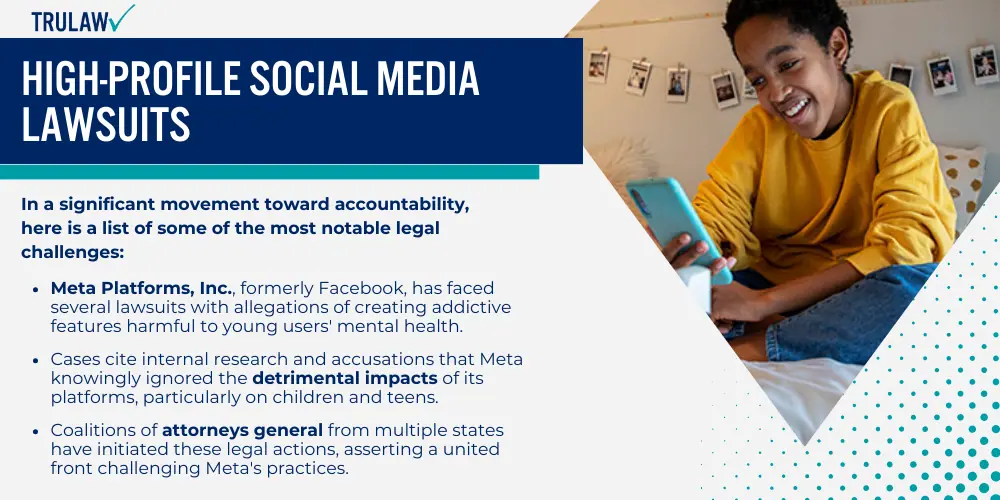
Landmark Cases Against Facebook, Twitter, And Instagram
Several pivotal legal actions have unfolded, targeting major social platforms for various alleged lapses in duty of care.
Claims typically focus on accusations that companies failed to protect users from harm.
In a significant movement toward accountability, here is a list of some of the most notable legal challenges:
- Meta Platforms, Inc., formerly Facebook, has faced several lawsuits with allegations of creating addictive features harmful to young users’ mental health.
- Cases cite internal research and accusations that Meta knowingly ignored the detrimental impacts of its platforms, particularly on children and teens.
- Coalitions of attorneys general from multiple states have initiated these legal actions, asserting a united front challenging Meta’s practices.
- Beyond Meta, Twitter and Instagram have also been under scrutiny, with cases arguing these platforms similarly expose users to psychological harm.
Settlements And Verdicts In Social Media Harm Lawsuits
The resolutions of social media harm lawsuits often set precedents and can push for changes within the industry.
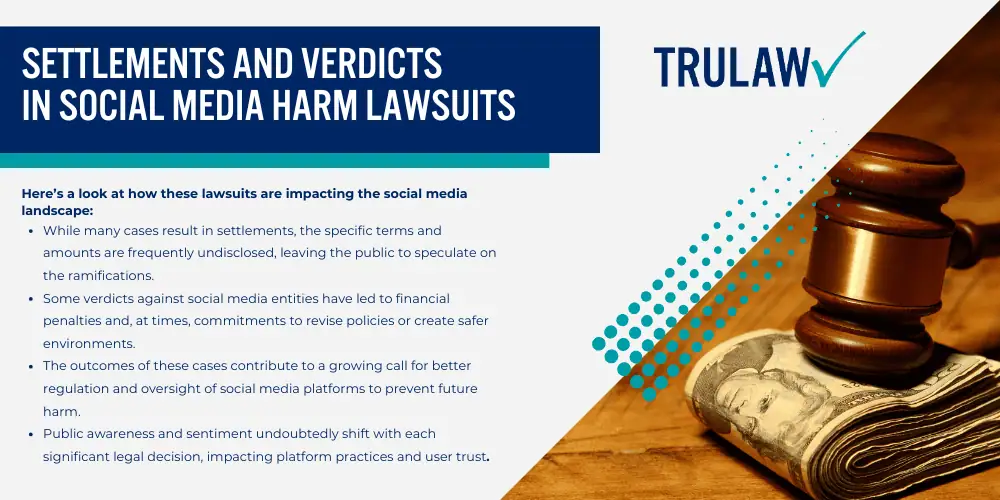
Here’s a look at how these lawsuits are impacting the social media landscape:
- While many cases result in settlements, the specific terms and amounts are frequently undisclosed, leaving the public to speculate on the ramifications.
- Some verdicts against social media entities have led to financial penalties and, at times, commitments to revise policies or create safer environments.
- The outcomes of these cases contribute to a growing call for better regulation and oversight of social media platforms to prevent future harm.
- Public awareness and sentiment undoubtedly shift with each significant legal decision, impacting platform practices and user trust.
The legal challenges of social media harm lawsuits are indicative of a broader concern for user well-being and the ethical responsibilities of tech giants in moderating content and designing their platforms.
Legal Strategies In Social Media Harm Cases
The strategies used in social media harm cases hinge on establishing responsibility and overcoming the legal hurdles associated with causation and damages.
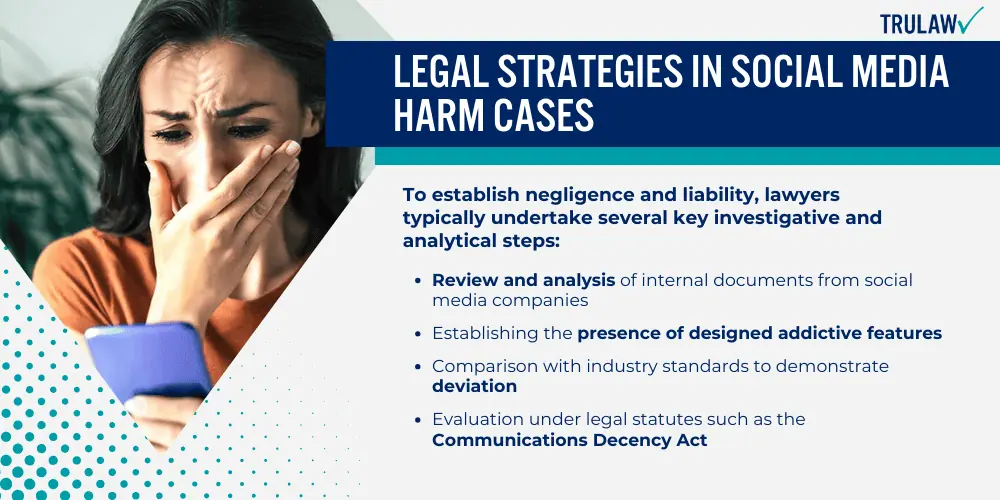
Proving Negligence And Liability Of Social Media Companies
Attorneys focus on evidence demonstrating how social media platforms may have failed to protect users, particularly minors, from potential harm.
To establish negligence and liability, lawyers typically undertake several key investigative and analytical steps:
- Review and analysis of internal documents from social media companies
- Establishing the presence of designed addictive features
- Comparison with industry standards to demonstrate deviation
- Evaluation under legal statutes such as the Communications Decency Act
Liability in these cases hinges on showing that the social media platforms had a duty to protect users and breached that duty.
Challenges In Establishing Causation And Damages
Proving that the social media platform directly caused the alleged harm and quantifying damages can be one of the most challenging aspects of these cases.
To overcome these hurdles, legal teams deploy a comprehensive approach involving:
- Collection of expert testimonies in fields like psychology and digital media
- Demonstrating proximity between addictive social media usage and mental health issues
- Quantifying damages through economic and non-economic means
- Addressing defense arguments such as user choice and responsibility
Lawyers must navigate through a rigorous process of presenting conclusive evidence to support the claims of harm attributed directly to social media use.
Impact Of Social Media Lawsuits On Plaintiffs
The social media harm lawsuits against major social media companies like Meta highlight the serious emotional and psychological impacts of the platforms on plaintiffs, particularly young users.
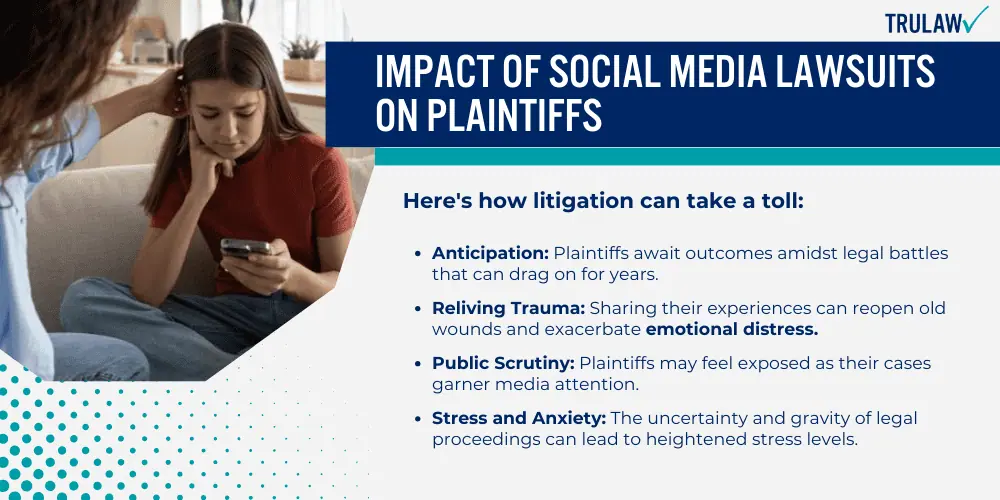
They highlight demands for justice and the search for closure in the wake of the youth mental health crisis.
Emotional And Psychological Toll Of Litigation
Litigating against big tech companies involves a significant emotional and psychological toll on plaintiffs.
They must often relive distressing experiences and publicly share personal struggles with mental health linked to social media use.
Here’s how litigation can take a toll:
- Anticipation: Plaintiffs await outcomes amidst legal battles that can drag on for years.
- Reliving Trauma: Sharing their experiences can reopen old wounds and exacerbate emotional distress.
- Public Scrutiny: Plaintiffs may feel exposed as their cases garner media attention.
- Stress and Anxiety: The uncertainty and gravity of legal proceedings can lead to heightened stress levels.
Intense media coverage and the overwhelming nature of confronting tech giants add layers of pressure and appraisal to the process.
Potential For Closure And Accountability
Despite the stresses of litigation, these lawsuits offer a path toward closure and accountability for affected individuals.
They shine a spotlight on the approaches social media companies take towards young users’ mental health.
Here are some of the ways lawsuits can make a difference:
- Acknowledgment: Public recognition of the plaintiff’s grievances validates their experiences.
- Reformation: Successful suits can force companies to reconsider product designs and policies.
- Precedent: Cases set examples for future actions against negligent social media practices.
- Compensation: While not undoing damage, settlements or judgments provide tangible recognition of wrongdoing.
Through these actions, plaintiffs seek to hold companies accountable and catalyze change for future generations of users.
Social Media Companies' Response To Lawsuits
In response to the wave of lawsuits, social media companies have taken distinct approaches, ranging from legal defenses to implementing new user safety measures.
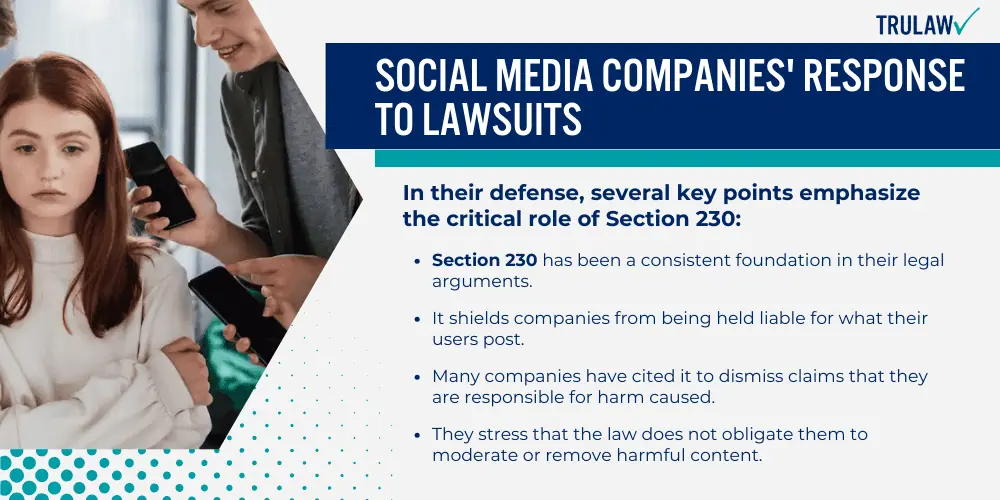
Denying Responsibility And Invoking Section 230 Immunity
Social media platforms under scrutiny have commonly denied direct responsibility for user content, pointing to Section 230 of the Communications Decency Act as a safeguard.
They argue that this rule provides immunity from lawsuits related to content generated by users because they serve as platforms, not publishers.
In their defense, several key points emphasize the critical role of Section 230:
- Section 230 has been a consistent foundation in their legal arguments.
- It shields companies from being held liable for what their users post.
- Many companies have cited it to dismiss claims that they are responsible for harm caused.
- They stress that the law does not obligate them to moderate or remove harmful content.
Implementing Policy Changes And Safety Measures
On the other hand, as pressure mounts, social media companies have also prioritized user safety by revising policies and enhancing protective features.
Here are the notable measures taken:
- Meta and other social media platforms introduced age verification tools to restrict underage access.
- They have rolled out features designed to flag harmful content more efficiently.
- Numerous updates have been made to community guidelines to address the issues raised.
- Investment in technology for improved detection and moderation of content has been a focus.
- Mental health resources have been made more readily available to users.
- Parental control options have been expanded and improved for better oversight.
The Future Of Social Media Harm Litigation
The trajectory of lawsuits targeting social media harm indicates a significant shift toward accountability for social media giants.
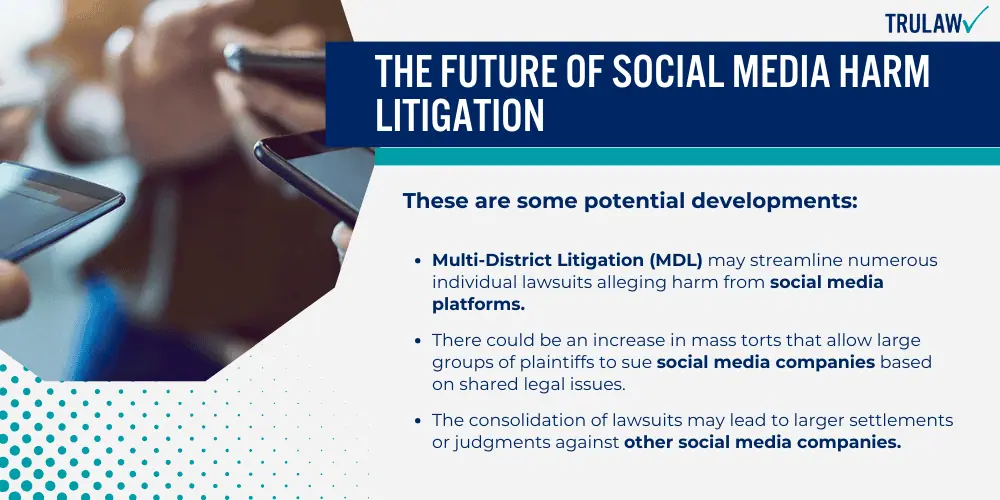
Potential For Class Action Lawsuits And Mass Torts
Class action lawsuits have become a pivotal tool for addressing the impact of social media on users.
These are some potential developments:
- Multi-District Litigation (MDL) may streamline numerous individual lawsuits alleging harm from social media platforms.
- There could be an increase in mass torts that allow large groups of plaintiffs to sue social media companies based on shared legal issues.
- The consolidation of lawsuits may lead to larger settlements or judgments against other social media companies.
- Social media giants may face increased exposure to lawsuits as awareness of their platforms’ potential harm grows.
Legislative Efforts To Regulate Social Media Platforms
Legislative efforts are intensifying to establish regulations for social media platforms.
Actions may include:
- Creation of laws to protect minors from targeted harm caused by social media algorithms.
- Strengthening of privacy laws to constrain how social media companies collect and use personal data.
- Implementation of age verification systems by social media platforms to protect younger users.
- Mandating transparency reports from social media companies, outlining the effects of their platforms on users’ mental health.
Balancing Free Speech And User Protection
In the evolving social media landscape, the tension between protecting user rights and upholding free speech is constantly under scrutiny.
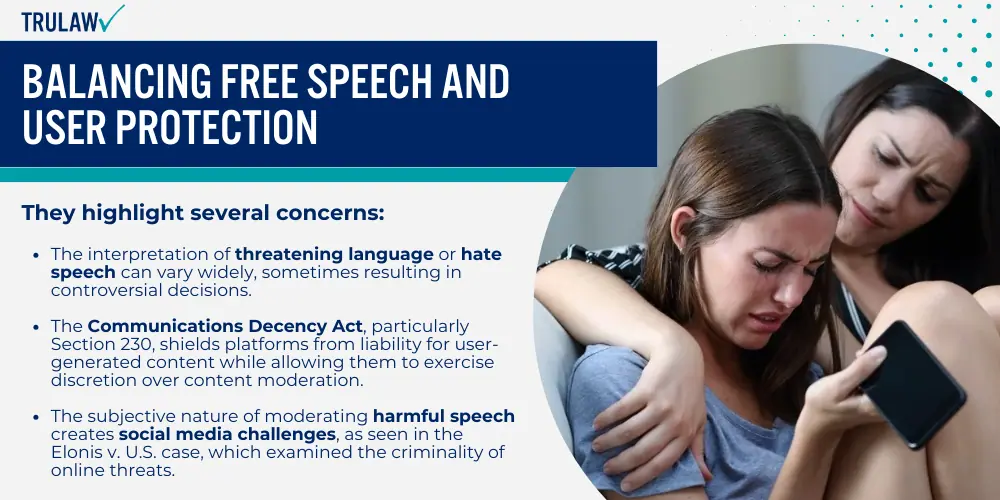
Lawsuits and public debate often focus on how platforms moderate content and the legal frameworks that guide these practices.
Debate Over Social Media Companies’ Content Moderation Policies
Social media companies are often scrutinized for their content moderation policies.
Critics argue these policies can be inconsistently applied, leading to disputes over what constitutes harmful content versus protected speech.
They highlight several concerns:
- The interpretation of threatening language or hate speech can vary widely, sometimes resulting in controversial decisions.
- The Communications Decency Act, particularly Section 230, shields platforms from liability for user-generated content while allowing them to exercise discretion over content moderation.
- The subjective nature of moderating harmful speech creates social media challenges, as seen in the Elonis v. U.S. case, which examined the criminality of online threats.
- User protection relies on these policies to shield individuals from harassment, disinformation, and other harmful online behaviors.
Calls For Increased Transparency And User Control
The demand for platforms to be more open about their content moderation processes is on the rise.
Here are key areas where users and advocates are pushing for change:
- Transparency reports detailing the number of posts removed or flagged and the reasoning behind these actions.
- More user-friendly tools to allow individuals to control the content they see and manage their online experience.
- User appeal processes for content decisions to ensure a fair hearing.
- Public disclosure of the algorithms and criteria used in content moderation to reduce potential bias and promote fairness.
These efforts aim to create a balance where the protections offered by the Communications Decency Act do not come at the expense of user safety and the right to free expression.
Lessons From Social Media Harm Lawsuits
Recent lawsuits highlight the pressing need for better strategies to address online dangers and boost users’ digital understanding.
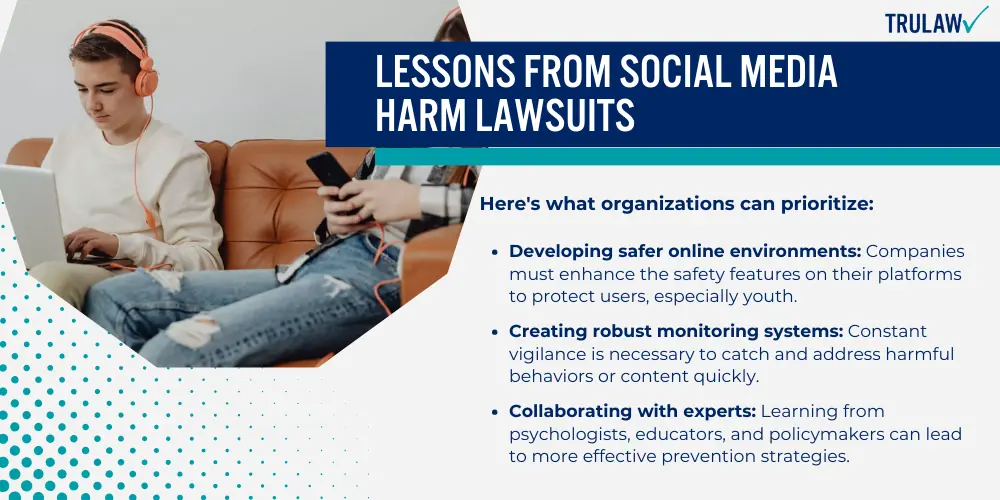
Need For Proactive Measures To Prevent Online Harms
Social media platforms are being scrutinized for their role in online harm.
The legal actions taken against companies like Meta suggest that preventing such harm requires proactive efforts.
Here’s what organizations need to prioritize:
- Developing safer online environments: Companies must enhance the safety features on their platforms to protect users, especially youth.
- Creating robust monitoring systems: Constant vigilance is necessary to catch and address harmful behaviors or content quickly.
- Collaborating with experts: Tapping into knowledge from psychologists, educators, and policymakers can lead to more effective prevention strategies.
- Standing for transparency: Clear communication about algorithms and data management can build trust and assist in preventing misuse.
Importance Of User Education And Digital Literacy
Understanding the online landscape is a key defense against its risks.
Education and literacy efforts must be front and center to empower users:
- Offering resources and tools: Providing users with easy-to-understand resources can foster safer online interactions.
- Incorporating digital literacy in schools: Formal education can play a significant role in preparing young people for the digital world.
- Launching public awareness campaigns: Public initiatives can raise the profile of digital literacy and its significance.
- Supporting community-based programs: Grassroots movements can tailor education efforts to specific community needs, bridging the digital literacy gap.
Trulaw: #1 Social Media Lawsuit Attorneys
When social media platforms cross the line, individuals often seek the expertise of specialized legal representatives to address their grievances.
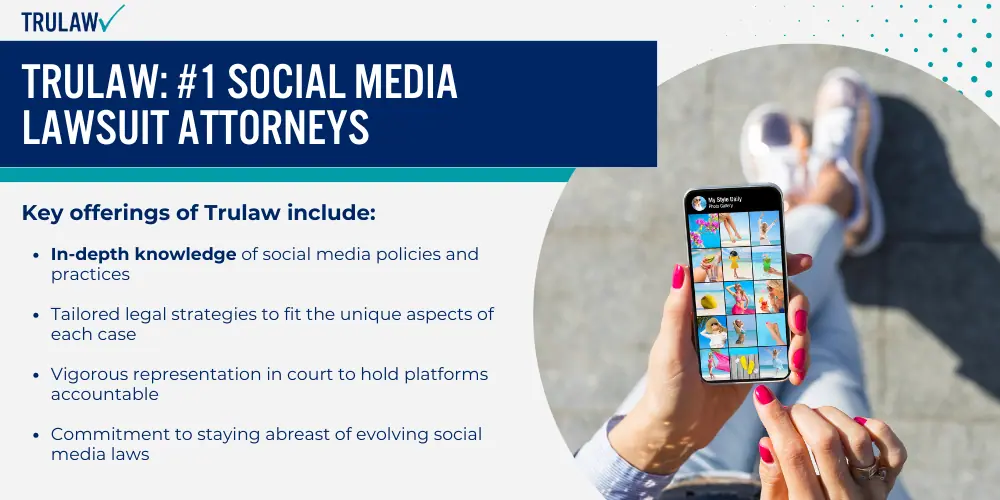
Trulaw stands prominently as a dedicated advocate in these scenarios, addressing disputes involving online harm with a thorough understanding of the digital landscape.
Offering a free case review, Trulaw demonstrates their confidence and dedication to potential clients.
Social media attorneys at Trulaw focus on representing clients involved in cases against major online platforms.
They bring forward concerns about mental health impacts and privacy breaches.
Key offerings of Trulaw include:
- In-depth knowledge of social media policies and practices
- Tailored legal strategies to fit the unique aspects of each case
- Vigorous representation in court to hold platforms accountable
- Commitment to staying abreast of evolving social media laws
Prospective clients can benefit from the free case review to evaluate the merits of their potential claims without upfront costs.
Trulaw provides this to ensure that the rights of social media users are not overlooked or dismissed without due consideration.
The attorneys pool their collective expertise to provide clear, neutral, and informed guidance to those affected by social media-related issues.
This approach underscores why many regard Trulaw as a top choice for navigating these particular legal battles.
Social Media Harm Lawsuits Frequently Asked Questions
-
What are the grounds for filing a lawsuit against social media companies for mental health harms?
Attorneys general from various states have initiated legal action against Meta, citing the intentional design of addictive features on platforms like Instagram.
The lawsuits argue that these features contribute to student’s mental health problems and that companies misrepresented the safety of their platforms.
-
How does one join a class action lawsuit involving harm caused by social media platforms?
To join one of the social media harm lawsuits, individuals typically must have experienced similar issues as those stated in the lawsuit.
They must also sign on with the law firm handling the case, which will then add them as class members.
-
What have been the typical compensation amounts awarded in social media harm lawsuits?
Compensation amounts in social media harm lawsuits vary widely, depending on the specifics of each case.
Some settlements could involve millions of dollars, while individual compensation might be less if distributed among a large group of plaintiffs.
-
How are schools addressing legal issues regarding social media and the well-being of students?
Schools have begun implementing policies that discourage harmful social media use.
Schools take steps to combat social media’s negative implications by offering education on digital citizenship, partnering with parents, and providing support services.
-
Can an individual claim damages for social media addiction, and what precedents exist?
Individuals can file claims for social media addiction, and there have been precedents where courts have recognized the deleterious effects of overuse.
Claimants must demonstrate harm and establish a link between the addiction and the social media company’s actions.
-
What legal remedies are available for victims of defamation on social media platforms?
Victims of defamation on social media can seek legal remedies such as issuing a takedown notice, pursuing a court order to remove the defamatory content, and filing a lawsuit for damages against the perpetrator.
Additionally, platforms may be held accountable under certain laws if they fail to take action against defamatory posts.

Managing Attorney & Owner
With over 25 years of legal experience, Jessica Paluch-Hoerman is an Illinois lawyer, a CPA, and a mother of three. She spent the first decade of her career working as an international tax attorney at Deloitte.
In 2009, Jessie co-founded her own law firm with her husband – which has scaled to over 30 employees since its conception.
In 2016, Jessie founded TruLaw, which allows her to collaborate with attorneys and legal experts across the United States on a daily basis. This hypervaluable network of experts is what enables her to share the most reliable, accurate, and up-to-date legal information with our readers!
Additional Social Media Harm Lawsuits resources on our website:
Here, at TruLaw, we’re committed to helping victims get the justice they deserve.
Alongside our partner law firms, we have successfully collected over $3 Billion in verdicts and settlements on behalf of injured individuals.
Would you like our help?
At TruLaw, we fiercely combat corporations that endanger individuals’ well-being. If you’ve suffered injuries and believe these well-funded entities should be held accountable, we’re here for you.
With TruLaw, you gain access to successful and seasoned lawyers who maximize your chances of success. Our lawyers invest in you—they do not receive a dime until your lawsuit reaches a successful resolution!
AFFF Lawsuit claims are being filed against manufacturers of aqueous film-forming foam (AFFF), commonly used in firefighting.
Claims allege that companies such as 3M, DuPont, and Tyco Fire Products failed to adequately warn users about the potential dangers of AFFF exposure — including increased risks of various cancers and diseases.
Depo Provera Lawsuit claims are being filed by individuals who allege they developed meningioma (a type of brain tumor) after receiving Depo-Provera birth control injections.
A 2024 study found that women using Depo-Provera for at least 1 year are five times more likely to develop meningioma brain tumors compared to those not using the drug.
Suboxone Tooth Decay Lawsuit claims are being filed against Indivior, the manufacturer of Suboxone, a medication used to treat opioid addiction.
Claims allege that Indivior failed to adequately warn users about the potential dangers of severe tooth decay and dental injuries associated with Suboxone’s sublingual film version.
Social Media Harm Lawsuits are being filed against social media companies for allegedly causing mental health issues in children and teens.
Claims allege that companies like Meta, Google, ByteDance, and Snap designed addictive platforms that led to anxiety, depression, and other mental health issues without adequately warning users or parents.
Transvaginal Mesh Lawsuits are being filed against manufacturers of transvaginal mesh products used to treat pelvic organ prolapse (POP) and stress urinary incontinence (SUI).
Claims allege that companies like Ethicon, C.R. Bard, and Boston Scientific failed to adequately warn about potential dangers — including erosion, pain, and infection.
Bair Hugger Warming Blanket Lawsuits involve claims against 3M — alleging their surgical warming blankets caused severe infections and complications (particularly in hip and knee replacement surgeries).
Plaintiffs claim 3M failed to warn about potential risks — despite knowing about increased risk of deep joint infections since 2011.
Baby Formula NEC Lawsuit claims are being filed against manufacturers of cow’s milk-based baby formula products.
Claims allege that companies like Abbott Laboratories (Similac) and Mead Johnson & Company (Enfamil) failed to warn about the increased risk of necrotizing enterocolitis (NEC) in premature infants.
Here, at TruLaw, we’re committed to helping victims get the justice they deserve.
Alongside our partner law firms, we have successfully collected over $3 Billion in verdicts and settlements on behalf of injured individuals.
Would you like our help?
